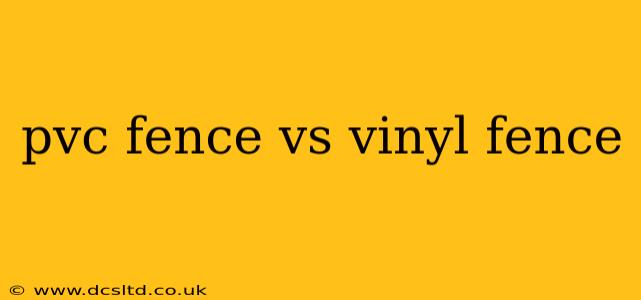Choosing the right fencing material can significantly impact your property's aesthetics, durability, and overall value. Two popular contenders often top the list: PVC and vinyl fences. While the terms are frequently used interchangeably, there are subtle yet important distinctions between PVC and vinyl fencing. This comprehensive guide will clarify these differences and help you make an informed decision for your needs.
What is PVC Fencing?
PVC, or polyvinyl chloride, is a rigid plastic known for its exceptional strength and durability. PVC fencing is typically manufactured using a higher-quality, thicker material than vinyl, resulting in a fence that's exceptionally resistant to impacts, extreme weather conditions, and the general wear and tear of everyday life. This robustness often translates to a longer lifespan and greater overall value retention. Think of it as the "heavy-duty" option in the plastic fencing world.
What is Vinyl Fencing?
Vinyl fencing is also made from polyvinyl chloride (PVC), but often with a lower-grade, thinner material compared to PVC fencing. While still offering many benefits like low maintenance and weather resistance, vinyl fences may be less robust and susceptible to damage from strong impacts or extreme weather events. It's generally a more affordable option upfront, but this could translate to potentially higher costs down the line due to repairs or shorter lifespan.
PVC Fence vs. Vinyl Fence: Key Differences Summarized
| Feature | PVC Fence | Vinyl Fence |
|---|---|---|
| Material | Higher-grade, thicker PVC | Lower-grade, thinner PVC |
| Durability | Extremely durable, resistant to impacts | Less durable, more prone to damage |
| Lifespan | Generally longer lifespan | Potentially shorter lifespan |
| Cost | Higher initial cost | Lower initial cost |
| Maintenance | Very low maintenance | Low maintenance |
| Appearance | Often features a more realistic wood-grain look | Can have a less realistic appearance |
| Color Options | Wide variety, often including deeper, richer colors | Generally fewer color options |
What are the Pros and Cons of PVC Fencing?
Pros:
- Exceptional Durability: Resists damage from impacts, extreme weather, and UV rays.
- Long Lifespan: Can last for decades with minimal maintenance.
- Low Maintenance: Requires little to no upkeep, saving you time and money.
- Pest Resistant: Unaffected by termites, rot, or other pests.
- Eco-Friendly: Many PVC fences are made with recycled materials.
Cons:
- Higher Initial Cost: Significantly more expensive than vinyl or wood fences.
- Can Be Difficult to Repair: Major damage may require professional repair.
What are the Pros and Cons of Vinyl Fencing?
Pros:
- Affordable: Lower initial cost compared to PVC fencing.
- Low Maintenance: Requires minimal upkeep.
- Weather Resistant: Withstands various weather conditions.
- Pest Resistant: Immune to pests and rot.
Cons:
- Less Durable: More susceptible to damage from impacts and extreme weather.
- Shorter Lifespan: May not last as long as PVC fencing.
- Appearance: May not have the same realistic wood-grain look as high-quality PVC.
How Long Do PVC and Vinyl Fences Last?
The lifespan of both PVC and vinyl fences varies depending on several factors, including quality of materials, installation, and environmental conditions. However, a well-maintained PVC fence can last 30-50 years or even longer, while a vinyl fence may last 15-25 years. This difference in longevity often justifies the higher initial cost of PVC.
Which is Better: PVC or Vinyl?
The "better" option depends entirely on your individual needs and budget. If longevity and exceptional durability are paramount, the higher initial investment in a PVC fence is likely worthwhile. However, if budget is a primary concern and you're willing to accept a potentially shorter lifespan and slightly lower durability, vinyl fencing offers a more affordable alternative.
Is PVC the Same as Vinyl?
While both are made from polyvinyl chloride, PVC fencing is typically manufactured using a higher-grade, thicker material resulting in a more durable and longer-lasting product. Vinyl fencing utilizes a lower-grade material, leading to differences in durability and lifespan. Therefore, while they share a common base material, they are not identical.
Are PVC and Vinyl Fences Eco-Friendly?
Both PVC and vinyl fences can be considered relatively eco-friendly compared to wood, as they require less maintenance and don’t contribute to deforestation. However, the manufacturing process of PVC can have environmental impacts, and some consumers prefer to choose products made with recycled materials whenever possible. Researching manufacturers with sustainable practices is recommended.
This comprehensive guide should help clarify the distinctions between PVC and vinyl fences. Remember to consider your budget, desired lifespan, and maintenance preferences when making your decision. Investing in high-quality materials and professional installation will ensure that your new fence provides years of reliable service.
